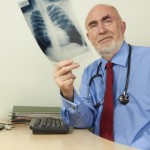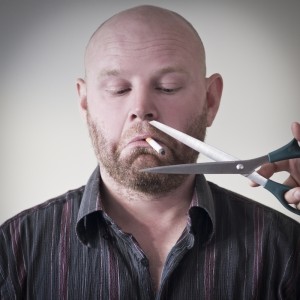
As previously discussed on the Mental Elf, the rates of tobacco smoking in most developed countries are falling, helped in part by high levels of taxation and bans on smoking in public places.
However, over 20% of adults in the UK continue to smoke, and this means that smoking is the greatest single cause of premature illness and death. Therefore, anything that can be done to persuade smokers to quit is likely to have a major impact on public health.
General Practitioners and other health professionals could play an important role if they simply advised their patients to stop smoking as a precursor to prescribing medication, or referring them to local Stop Smoking services. In this Cochrane review, Stead et al. (2013) looked at whether advice from doctors could help their patients to quit smoking.
Methods
This paper is an update of previous Cochrane reviews on this topic. The authors identified randomised controlled trials that examined the influence of smoking cessation advice from a medical practitioner on abstinence from smoking at least 6 months later.
Having identified relevant papers, the authors pooled the data and asked:
- Is advice from a doctor to give up smoking more effective than no advice, in terms of the number of patients who manage to quit?
- Are there any benefits of offering more intensive advice (as opposed to just giving brief advice), and of following patients up afterwards?
Results

Brief advice and intensive advice both improve quit rates, but only everso slightly
The total sample size was over 31,000, from 42 randomised trials that were published between 1972 and 2012.
The majority of the individual trials randomly assigned people to receive brief advice to give up smoking, or they got no advice at all (not even a wagging of the finger). There was enormous variation in what constituted ‘brief advice’, but this didn’t seem to affect the overall results too much.
There were 17 trials in which the intervention was classed as minimally intensive ‘brief advice’, and 11 trials in which the intervention was classed as more intensive.
- Comparison of minimally intensive brief advice with no advice demonstrated that brief advice led to a small but significant increase in quit rates (Relative Risk (RR) = 1.66, 95% CI 1.42 to 1.94)
- Comparisons of more intensive advice with no advice also demonstrated an increase in quit rates (RR = 1.84; 95% CI 1.60 to 2.13)
- However, this indirect comparison between different studies revealed no statistically significant difference between brief advice and more intensive advice (note the overlapping confidence intervals).
There were fifteen additional trials that made a direct comparison between intensive advice and brief advice. This revealed significantly higher quit rates among people who received intensive advice compared to those who received only brief advice (RR = 1.37, 95% CI 1.20 to 1.56).
Other findings included a small incremental effect on quit rates if follow-ups were provided after the initial advice. However, provision of additional aids (such as self-help manuals) did not make much difference, and there were minimal differences between different types of intervention.
Discussion

Giving smokers brief advice to help them quit is better than nothing, but only just! However, it’s cheap and easy so definitely something that GPs should be doing.
Overall, patients who receive brief advice to quit smoking from their doctor are more likely to actually do so, compared to patients who receive no advice. The effect size is small, although it is slightly larger if the advice is more intensive, or if patients are followed up a bit later.
Can brief advice make a difference in the real world? The ‘unassisted quit rate’ (the percentage of smokers who will quit if given no help or advice whatsoever) is difficult to estimate, and it varied enormously between studies in this analysis. But a plausible estimate is 3%, and this gives us a ‘number needed to treat for an additional beneficial outcome’ (NNTB) ranging between 33 and 80. In other words, doctors would need to offer brief advice to between 33 and 80 of their patients in order to get one of them to stop smoking! While this may seem rather pitiful, we have to remember that most smokers do not manage to quit by themselves and anything that nudges smokers towards quitting, particularly something very quick and easy like brief advice from a doctor, should be put into practice whenever possible. The authors conclude their paper by stating that:
Every smoker who does not receive advice represents a missed opportunity.
And the Mental Elf agrees with that!
Links
Stead LF, Buitrago D, Preciado N, Sanchez G, Hartmann-Boyce J, Lancaster T. Physician advice for smoking cessation. Cochrane Database of Systematic Reviews 2013, Issue 5. Art. No.: CD000165. DOI: 10.1002/14651858.CD000165.pub4.
Cochrane summary of this review


My latest for @Mental_Elf: do people stop smoking if their GP advises them to? Summary of Cochrane review http://t.co/n1HslvJcde
.@field_matt @GordonAlanBeard @Mental_Elf the more my doc said “quit”, the more I dug my heels in. Get ’em to say “switch” to e-cigs
@Hifistud @field_matt @GordonAlanBeard @Mental_Elf I used to groan every time it was mentioned, the more they pushed the more I pushed back!
@Hifistud @field_matt @GordonAlanBeard @Mental_Elf “Quit” is such a heavy and disappointing demand. Switch is the best!
@Mental_Elf evidence to support making every contact count! #MECC @drjopps
Do people stop smoking if their doctor advises them to? Cochrane review says sometimes and it IS worth the eff… http://t.co/iXngty0N5O
evidence to support MECC! http://t.co/XTGcTMuEfO”
As previously discussed on the Mental Elf, the rates of tobacco smoking in most developed countries are falling,… http://t.co/GOoKbbASmY
@clarercgp What do you think of this @CochraneTAG review on brief advice for smoking cessation? http://t.co/BM7qt3Q6WB @field_matt (1/2)
RT @mental_elf: Do people stop smoking if their doctor advises them to? http://t.co/xDo0CDT4pK
Pls RT @CR_UK @TheBHF @nhssmokefree @PHE_uk @NHSChoices Do people stop smoking if their doctor advises them to? http://t.co/BM7qt3Q6WB
New #CochraneEvidence finds that GPs have an important role to play in helping smokers quit http://t.co/BM7qt3Q6WB
Do people stop smoking if doctor advises them? Cochrane review says sometimes and IS worth the effort http://t.co/1t7BSCQGlj via @sharethis
Send this to the chief of your smoking police. Updated Cochrane on brief int http://t.co/Qp5pZpP675
“Every smoker who does not receive advice [to quit] represents a missed opportunity” says @CochraneTAG http://t.co/BM7qt3Q6WB
Do people stop smoking if their doctor advises them to? Cochrane review says sometimes, but is… http://t.co/a1Q2TZvZ14
Smoking cessation: ‘brief advice’ & ‘intensive advice’ from GPs both improve quit rates, but only everso slightly http://t.co/BM7qt3Q6WB
@Mental_Elf Wonder why studies still focus on abstinence rather than harm reduction: many people successfully swap to PREPS like e-cigs.
@RCGP @BMJ_latest @amcunningham @bengoldacre @ProfSteveField Do people stop smoking if their doctor advises them to? http://t.co/BM7qt3Q6WB
@Mental_Elf @RCGP @BMJ_latest @amcunningham @bengoldacre @ProfSteveField Biggest impact is legal changes that prevent smoking
@soozaphone I’d be interested in your thoughts on our blog today http://t.co/BM7qt3Q6WB @field_matt
@Mental_Elf @field_matt Nice. Seems like ‘every little helps’. The more encouragement that’s given,the more likely a quit success.
The NNTB for brief advice to quit smoking is 33-80, but it’s cheap & easy to do, so shouldn’t all GPs be doing it? http://t.co/BM7qt3Q6WB
@Mental_Elf yes, brief advice from GP and then they should come along to Specialist Stop Smoking Service like us for best support & success!
@Mental_Elf It would be good if some doctors would stop recommending smoking. That might help the cessation drive.
Do people #quitsmoking if their doctor advises them to? @mental_elf recaps the latest #CochraneEvidence http://t.co/iLPr9PS1ts
Lääkärin puhuttelu auttaa MT @CochraneLibrary: Do ppl quitsmoking if their doctor advises them to? @mental_elf recaps http://t.co/POkdP2Oc1M
@paivihelenius @CochraneLibrary @Mental_Elf Se auttaa moneen muuhunkin, mutta sitä ei ole Suomessa vain tarjolla. Se näkyy kyllä….
Brief smoking cessation advice – still worth doing http://t.co/ijFZyFkqKb @Smokefreeby2020 @ASH_New_Zealand
Mental Elf: Do people stop smoking if their doctor advises them to? Cochrane review says sometimes and it IS… http://t.co/ZfCjFYq3rP
[…] Does racial discrimination affect the mental health of children and young people? Do people stop smo… […]
Do people stop #smoking if their doctor advises them to? http://t.co/iYQFWnv6Nc #tobacco #health #medicine #addiction #nudge
@field_matt It was our most popular blog last week Matt, so it clearly generated some interest http://t.co/BM7qt3Q6WB
Runners up: @IanCummins9 http://t.co/TKN2fUvkX5 @field_matt http://t.co/BM7qt3Q6WB @dr_know http://t.co/zFQ2WwRdy0